HBO Max to increase price as Warner Bros. That’s discovery chief executive David Zaslav not-so-subtly telegraphing that monthly rates will rise and password sharing will be harder to get away with. Speaking at the Goldman Sachs Communacopia + Technology Conference, Zaslav said in prepared remarks that the service isn’t priced high enough given the Endgame capabilities of HBO and the wider Max catalog, while also standing by a company commitment to better password-check the service as it focuses on profitability.
HBO Max’s Basic with Ads plan is now $9.99 a month, its Standard ad-free tier is $16.99 and Premium is $20.99. The company has not revealed new price points or timing but the direction is clear: more revenue per subscriber and less free riding.

Why Warner Bros. Discovery Sees Room to Raise
For Zaslav, the math is simple: Prestige content and live programming can command higher rates. HBO’s recent run — from “House of the Dragon” to “The Last of Us” — is still a distinguishing factor, while the broader Max service is filled out by unscripted and library titles that lift engagement and keep churn low. “Results beat expectations on Virtually there” Sterne Agee CRT equity analyst Omar Saad said 8/21 Verizon’s direct-to-consumer division is flirting with sustained profitability as the cost of customer acquisition and re-designs have lifted recently but have “fallen below the cost increase in average revenue per customer”, management said on the call, regarding the $96 stable vs the prior $93.60. […] The segment’s 7% revenue growth receded into the rearview mirror as management has said that the average revenue per user [….] needs to increase to help support programming, sports rights and other product investments.” […] FILINGS: Verizon files & challenges, 8/31/2015corp.
The company has already raised prices in recent years, and introduced the B/R Sports Add-On, which comes with premium rights and costs.
Against that backdrop, that heftier sticker price is intended to close the gap between what viewers see and what the business takes in — all the more so as production budgets and fees for licenses to past TV series have risen across the industry.
Next Up: Cracking Down on Password Sharing
Zaslav also said HBO Max will start to pull back access for out-of-household use, a lever peers have already pulled. Netflix’s paid sharing option prompted record sign-ups and faster revenue-related growth in the United States, according to Antenna, a market research company; Disney has deployed enforcement, along with some options to add more users. The playbook is a familiar one: lines that more clearly define a “household,” device and location checks and a paid add-ons to make sharing legal.
Warner Bros. Discovery has been relatively conservative on enforcement thus far, leaving more of it to product polish and programming momentum. Harder guardrails now would bring HBO Max in line with market norms and turn nonpaying viewers into incremental revenue — a cleaner road to margin uplift than deep cost cuts that could undercut the slate.

What Subscribers Should Expect
Consumers should keep an eye out for in-app messages and email alerts explain any changes to billing and account policies. Ad-supported tiers could be the “value” entry points, as in other recent industry shifts, while ad-free tiers take the biggest hit increase in cost. Annual plans — where they exist to begin with — frequently ease the sting with its built-in discounts, and bundles of related services can offset hikes. Warner Bros. Discovery has also been aggressive with packaging — including a joint offer with Disney+ and Hulu across companies — to maintain high perceived value even as list prices rise.
If the company follows its rivals, enforcement will likely begin gently: clearer prompts, education on household rules and offers to add an “extra member” for a fee before an outright lockout. Anticipate small but steady nudges to entice casual borrowers into the paid ecosystem.
The Competitive Context
Streaming is in its price-power phase. Netflix’s high-end tier already tops $20 in the U.S., and other majors have posted a series of price hikes since the early growth-at-all-costs years. Research firms like Leichtman Research Group and Kantar have also published data showing a move toward ad-supported viewing and more thoughtful household budgeting on services, so that’s why you’re seeing platforms push both price and product differentiation at the same time.
For Warner Bros. Discovery, the wager is that HBO’s popular pipeline, the depth of the Max catalog and new live offerings are good for a higher bill — and that stricter account rules won’t trigger an outsize number of cancellations. Should Netflix’s experience be any guide, even short-term grumbling can be outweighed by higher paid membership and revenue that is more predictable.
Bottom Line
HBO Max is about to charge more and crack down on shared credentials. The game plan is a sign of where streaming is heading: less freebies, more clear lines, stiffer prices and premiums that attach to premium programming. Subscribers wishing to soften the blow might consider annual billing, lower ad-supported tiers or bundles — and look for official announcements over what comes next.

